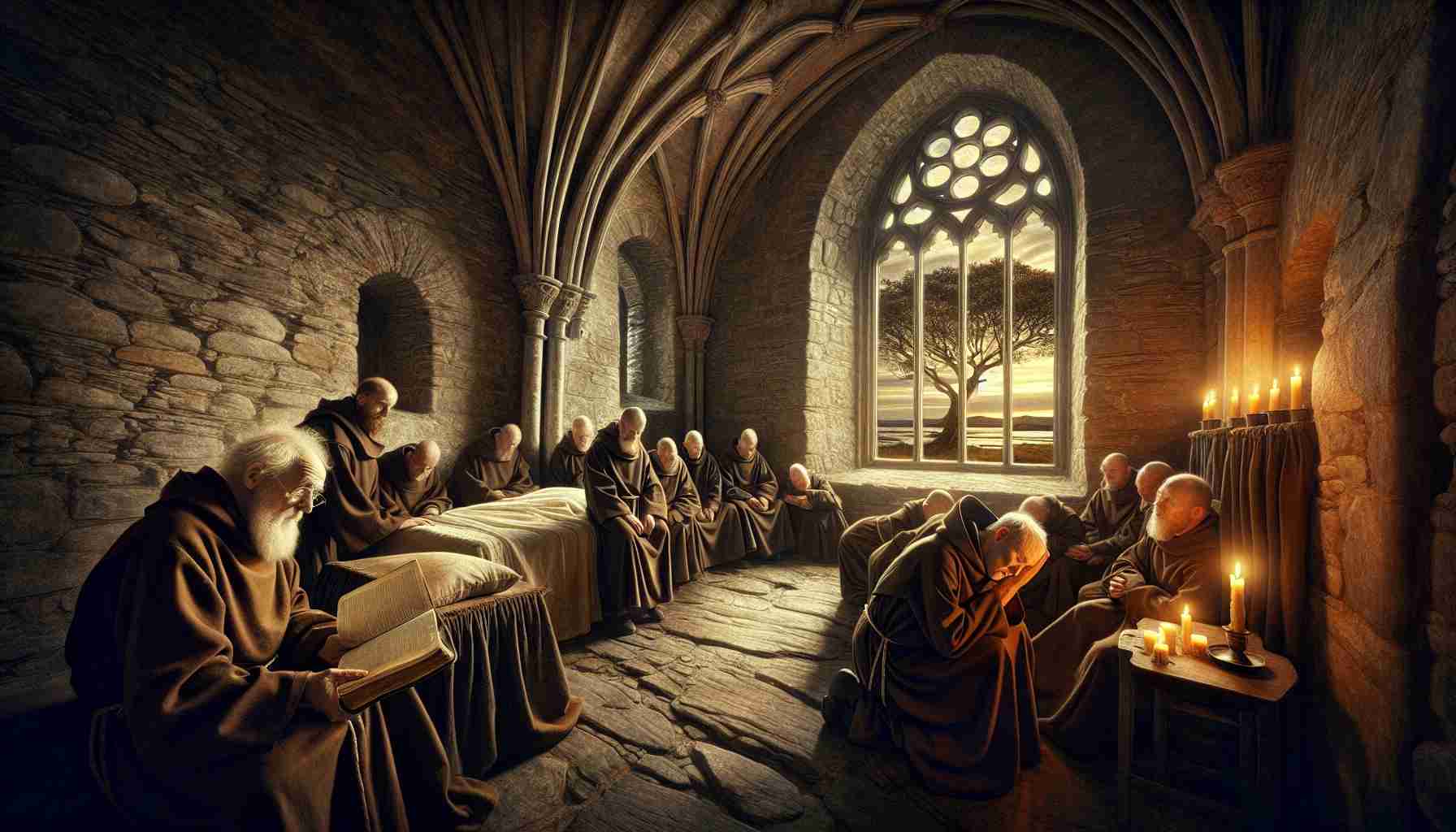

The wind off the Atlantic had long been his compass. Now, it moved gently over his weathered face, lying still beneath the monastery arches of Clonfert. The stone walls, worn smooth by the fingers of prayerful monks, held silent vigil as the breath in St. Brendan’s chest faded like the receding tide.
It was the year 577. Word of Brendan’s death had not yet rippled beyond the cloister, but heaven, it seemed, already knew. The torches sputtered; lambskin pages fluttered without hands to turn them; a seal broke on the reliquary outside the chapel. Those remaining watched, silent, afraid to name the sorrow taking root beneath the oaks.
Brendan the Navigator. They said he had sailed beyond the world itself.
It was no boast, for those who had seen his eyes—clear, blue, far-seeing—knew he beheld more than map or mast. Born in Tralee, baptized by Saint Erc, and tutored under Finnian of Clonard, Brendan’s youth had been steeped like flax in scripture. He memorized the prophets as he did the constellations, whispering Isaiah’s words to the waves: “I will lead the blind by ways they have not known, along unfamiliar paths I will guide them…” (Isaiah 42:16).
And so, at forty years of age, he gathered fourteen monks, built a leather-clad currach, and sought the "Promised Land of the Saints,” a place spoken of in vision and vestige—half Eden, half exile of the soul.
Their voyage, documented in the Navigatio Sancti Brendani Abbatis, told of brilliant islands veiled in flame, floating crystals larger than ships, and beasts that bore fire in their breath. One isle had Judas chained in penance, crying to the sea. Another, bright with music, echoed with psalms though no man sung them. Some called it allegory, others heresy. But Brendan never claimed any truth but God’s.
Still, even the most skeptical scribes in Tours and Reims kept ink ready for his tales. What Brendan sought was not geography but grace. And in his way, he found it—on planks over abyssal dark, in the hoarse winds that obeyed no stars, in miracles whispered more than witnessed.
When they returned, the monks kissed the soil of Ireland. Brendan, calm and unchanged, said little. Wisdom, he believed, did not require volume.
Clonfert Monastery rose under his guidance—a place of learning, healing, and holy repetition. His voice, once lifted in windswept fervor at sea, became the low chant guiding novices through prayer. And when famine threatened the west, it was Brendan who oversaw the opening of granaries, even if it meant emptying Clonfert's own stores.
He aged like mountain stone—slowly, with dignity. And now, on his final day, scripture again pressed to his lips, his last breath barely moved the edge of the Book of Isaiah.
Outside, Brother Tiernan knelt by the ash tree Brendan himself had planted. He recalled that winter morning when Brendan insisted they plant it there, saying only that God would shape its shadow. Birds now nested in it, silent as though in mourning.
Word came swiftly to Ardfert, to Inishmacdaff. Fishermen wept over their nets, and torchlight lit the roads between monasteries. A hundred abbots came in sandals split by rough roads, their psalters worn thin. They did not seek miracles. Brendan had never called them to spectacle—but to surrender.
He had not fought kings nor kindled insurrection, like the fiery Savonarola who centuries hence would be burned for his protest against corruption. Brendan’s weapon was wonder. He faced the unknown not with fury, but with faith. The world called him mad. Brendan only listened, and sailed deeper.
They buried him there beside the chapel. The stone carved above his resting place bore no heraldry, only a wave and a cross. The wind passed over it, continuing its journey, unbound.
And though generations blurred the truth of his voyage—debating whether the Navigator reached Iceland, Greenland, maybe even North America—Clonfert endured as his final harbor. Pilgrims still came, centuries later, tracing his steps not in sea charts but in silence. The cathedral there, rebuilt with Romanesque arches and Roman carved heads, looked east toward resurrection.
No tempest greeted the day of his passing. No omens, no censor swinging bright with flame.
Just the sea, endlessly calling, and one soul gone beyond its line.
Isaiah had promised, “I will turn the darkness into light before them and make the rough places smooth.”
Brendan had believed. And in that believing, sailed.